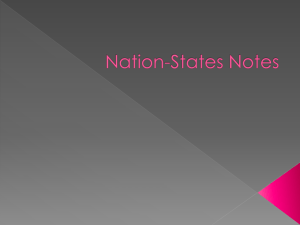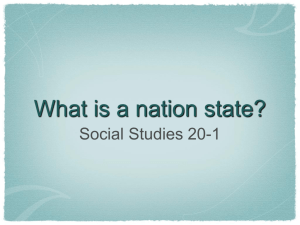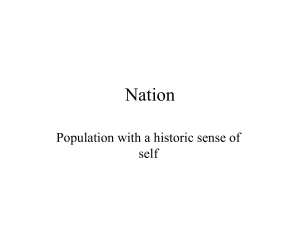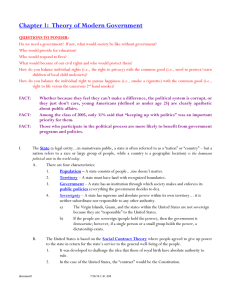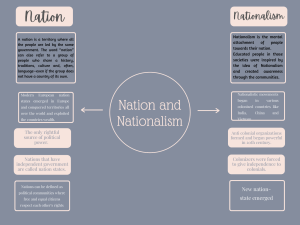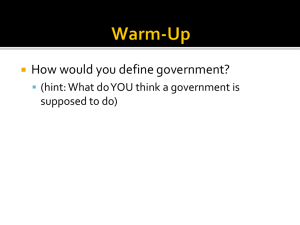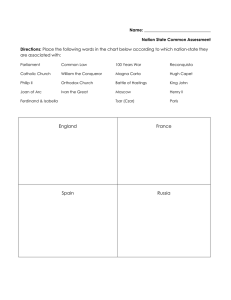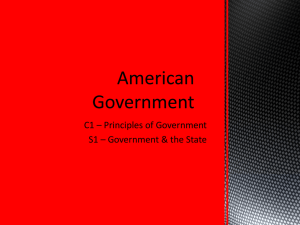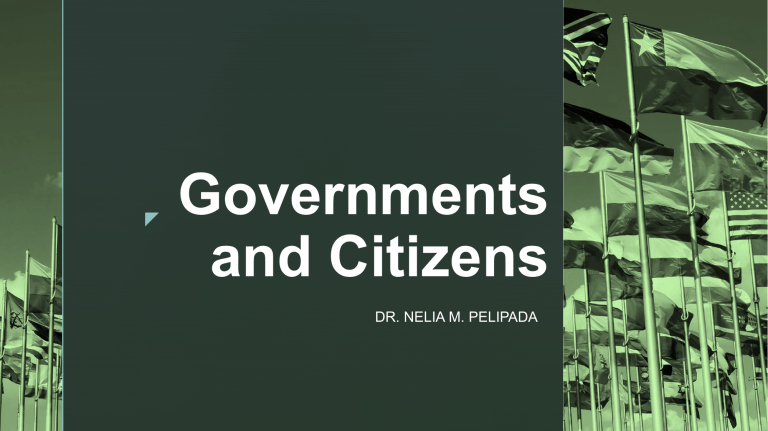
z Governments and Citizens DR. NELIA M. PELIPADA z Introduction The dynamics of governance do not play out solely within the boundaries of nation-states. Max Max Weber Weber' definition of the state as a human community that successfully claims the monopoly of the legitimate use of physical force within a given territory (Weber, 1946). z Definition of State A State is an independent, sovereign government exercising control over a certain spatially defined and bounded area, whose borders are usually clearly defined and internationally recognized by other states. States are tied to territory States have bureaucracies staffed by state’s own personnel States monopolize (sovereign) certain functions within its territory z Definition of Nation A nation is a stable community of people formed on the basis of a common language, territory, history, ethnicity, or psychological make-up manifested in a common culture. A nation is more overtly political than an ethnic group; z Difference between Nation and State A state is specifically a political and geopolitical entity, while a nation is a cultural and ethnic one. STATE • Elements NATION • Territory is not essential • Fixed Territory • Common political aspirations, social cultural and emotional unity • Sovereignty • Moral, emotional and spiritual power • Political organization • Police power z Nation-States and Sovereignty A nation-state is a type of state that conjoins the political entity of a state to the cultural entity of a nation, from which it aims to derive its political legitimacy to rule and potentially its status as a sovereign state The term “nation-state” implies that the two coincide, in that a state has chosen to adopt and endorse a specific cultural group as associated with it. The nation-state concept can be compared and contrasted with that of the multinational state, city-state, empire, confederation, and other state formations with which it may overlap. The key distinction is the identification of a people with a polity in the nation-state. z Political Risk The risk of loss when investing in a given country caused by changes in a country's political structure or policies, such as tax laws, tariffs, expropriation of assets, or restriction in repatriation of profits. z Political Risk Non-economic risk (Meyer 1985, Ciarrapico 1984); Unwanted government interference with business operations (Eiteman and Stonehill 1973, Aliber 1975, Henisz and Zelner 2010); The probability of disruption of the operations of MNEs by political forces or events (Root 1972, Brewers 1981, Jodice 1984, MIGA 2010); Discontinuities in the business environment deriving from political change, which have the potential to affect the profits or the objectives of a firm (Robock 1971, Thunell 1977, Micallef 1982); Substantially equated to political instability and radical political change in the host country (Green 1974, Thunell 1977 ). z International Law Is the set of rules, norms, and standards generally accepted in relations between nations. It establishes normative guidelines and a common conceptual framework to guide states across a broad range of domains, including war, diplomacy, trade, and human rights. International law allows for the practice of stable, consistent, and organized international relations.
